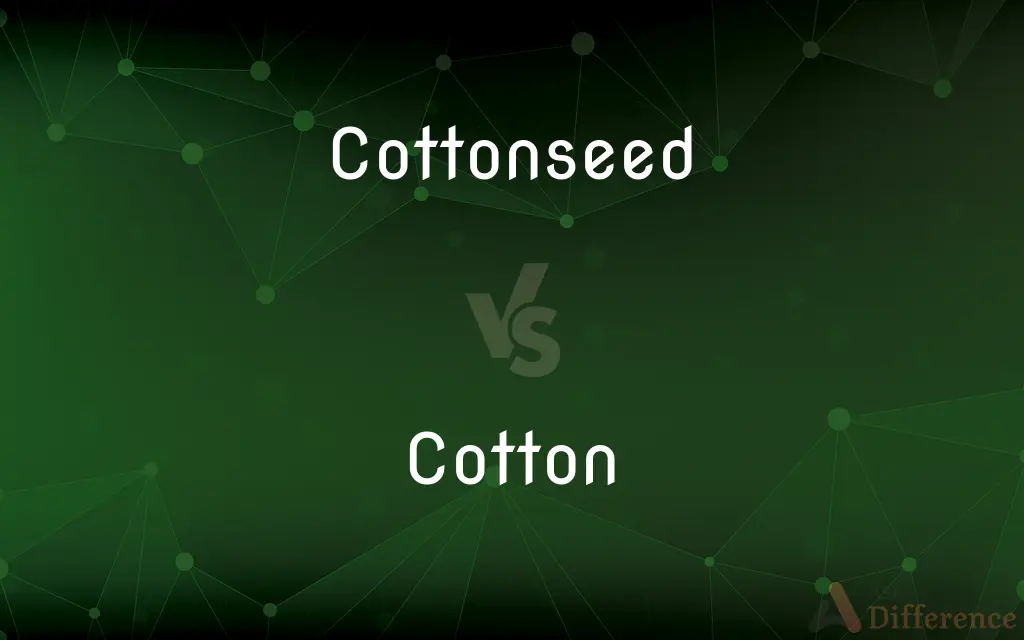Cottonseed vs. Cotton — What's the Difference?
By Maham Liaqat & Urooj Arif — Updated on April 23, 2024
Cottonseed, the seed of the cotton plant, is primarily used for oil and animal feed, whereas cotton, derived from the same plant's fibers, is extensively utilized in textile production.

Difference Between Cottonseed and Cotton
Table of Contents
ADVERTISEMENT
Key Differences
Cottonseed is a byproduct of cotton cultivation, used largely for extracting cottonseed oil and as a component in livestock feed. Whereas cotton primarily refers to the fluffy fibers surrounding the seeds of the cotton plant, which are spun into yarn or thread for fabric-making.
Cottonseed contains gossypol, a natural toxin that makes it unfit for direct human consumption without proper processing, while cotton fibers are processed and used extensively in the textile industry for making clothing, towels, and other fabric products.
The economic value of cottonseed lies in its applications in the oil industry and as a feedstock, whereas cotton's value is primarily in the textile industry, where it is prized for its softness, durability, and breathability.
Cottonseed oil is a significant vegetable oil used in cooking and food processing, on the other hand, cotton fibers are not consumed but are a staple resource in the global apparel and home furnishings markets.
In terms of global trade, cottonseed is often a secondary consideration compared to the primary market for raw cotton fibers, which are a major export commodity for countries like the United States and India.
ADVERTISEMENT
Comparison Chart
Use
Oil production, animal feed
Textile production
Derived from
Seed of the cotton plant
Fibers surrounding the seed
Toxicity
Contains gossypol, toxic to humans
Non-toxic, used in textiles
Economic Value
Secondary product, used in oil and feed
Primary product, highly valued in textiles
Consumption
Not directly consumable without processing
Directly used in fabric making
Compare with Definitions
Cottonseed
The seed of the cotton plant, used primarily for oil extraction.
The cottonseed is crushed to extract oil, which is then refined for cooking.
Cotton
A soft, fluffy staple fiber that grows in a boll around the seeds of cotton plants.
Cotton is harvested and spun into thread for textile production.
Cottonseed
Used in the production of cottonseed oil.
Cottonseed oil is popular in the food industry for its neutral flavor.
Cotton
Biodegradable and renewable.
Cotton is environmentally friendly due to its natural origins.
Cottonseed
A byproduct of cotton harvesting.
After harvesting cotton fibers, the leftover cottonseed is collected for other uses.
Cotton
Cultivated globally, with major producers in the USA, India, and China.
India's cotton industry significantly contributes to its economy.
Cottonseed
Integral to the livestock feed market.
Ground cottonseed is added to cattle feed for extra fat and protein.
Cotton
The primary material used in the textile industry.
Cotton fabrics are favored for their breathability and softness.
Cottonseed
Contains gossypol, limiting its use in human food.
Cottonseed requires processing to remove gossypol before it can be safely consumed.
Cotton
Extracted from the plant using various mechanical processes.
Modern machines efficiently separate cotton fibers from seeds.
Cottonseed
Cottonseed is the seed of the cotton plant.
Cotton
Cotton is a soft, fluffy staple fiber that grows in a boll, or protective case, around the seeds of the cotton plants of the genus Gossypium in the mallow family Malvaceae. The fiber is almost pure cellulose.
Cottonseed
The seed of the cotton plant, the source of cottonseed oil.
Cotton
Any of various shrubby plants of the genus Gossypium, having showy flowers and grown for the soft white downy fibers surrounding oil-rich seeds.
Cottonseed
The seed of the cotton plant
Cotton
The fiber of any of these plants, used in making textiles and other products.
Cottonseed
Seed of cotton plants; source of cottonseed oil
Cotton
Thread or cloth manufactured from the fiber of these plants.
Cotton
Any of various soft downy substances produced by other plants, as on the seeds of a cottonwood.
Cotton
To take a liking; attempt to be friendly
A dog that didn't cotton to strangers.
An administration that will cotton up to the most repressive of regimes.
Cotton
To come to understand. Often used with to or onto
"The German bosses ... never cottoned to such changes" (N.R. Kleinfield).
Cotton
Gossypium, a genus of plant used as a source of cotton fiber.
Cotton
Any plant that encases its seed in a thin fiber that is harvested and used as a fabric or cloth.
Cotton
Any fiber similar in appearance and use to Gossypium fiber.
Cotton
(textiles) The textile made from the fiber harvested from a cotton plant, especially Gossypium.
Cotton
(countable) An item of clothing made from cotton.
Cotton
Made of cotton.
Cotton
(transitive) To provide with cotton.
Cotton
To supply with a cotton wick.
Cotton
To fill with a wad of cotton.
Cotton
(horticulture) To wrap with a protective layer of cotton fabric.
Cotton
To cover walls with fabric.
Cotton
(tar and cotton) To cover with cotton bolls over a layer of tar (analogous to tar and feather )
Cotton
To make or become cotton-like
Cotton
To raise a nap, providing with a soft, cottony texture.
Cotton
To develop a porous, cottony texture.
Cotton
To give the appearance of being dotted with cotton balls.
Cotton
To enshroud with a layer of whiteness.
Cotton
To protect from harsh stimuli, coddle, or muffle.
Cotton
To rub or burnish with cotton.
Cotton
To get on with someone or something; to have a good relationship with someone.
Cotton
A soft, downy substance, resembling fine wool, consisting of the unicellular twisted hairs which grow on the seeds of the cotton plant. Long-staple cotton has a fiber sometimes almost two inches long; short-staple, from two thirds of an inch to an inch and a half.
Cotton
The cotton plant. See Cotten plant, below.
Cotton
Cloth made of cotton.
Cotton
To rise with a regular nap, as cloth does.
It cottons well; it can not choose but bearA pretty nap.
Cotton
To go on prosperously; to succeed.
New, Hephestion, does not this matter cotton as I would?
Cotton
To unite; to agree; to make friends; - usually followed by with.
A quarrel will end in one of you being turned off, in which case it will not be easy to cotton with another.
Didst see, Frank, how the old goldsmith cottoned in with his beggarly companion?
Cotton
To take a liking to; to stick to one as cotton; - used with to.
Cotton
Silky fibers from cotton plants in their raw state
Cotton
Fabric woven from cotton fibers
Cotton
Erect bushy mallow plant or small tree bearing bolls containing seeds with many long hairy fibers
Cotton
Thread made of cotton fibers
Cotton
Take a liking to;
Cotton to something
Common Curiosities
What are the major products derived from cotton?
The major products include clothing, home textiles like bed linens and towels, and industrial textiles.
What is the primary use of cottonseed?
Cottonseed is primarily used for extracting cottonseed oil and as animal feed.
Why is cottonseed not suitable for direct human consumption?
Cottonseed contains gossypol, a toxin that can be harmful to humans if not properly processed.
Is cottonseed oil edible?
Yes, after refining, cottonseed oil is edible and used in food products.
What are the health benefits of cottonseed oil?
Cottonseed oil is high in antioxidants and unsaturated fats, beneficial for heart health.
Can cotton be grown organically?
Yes, organic cotton is grown without synthetic pesticides or genetically modified seeds.
How are cotton fibers used?
Cotton fibers are spun into yarn or thread, which is then woven or knitted into textiles.
What environmental impact does cotton production have?
Cotton production can be water-intensive and may involve pesticides, impacting the environment.
How long does it take for cotton to be processed into fabric?
Processing time can vary, but it generally takes several weeks from cotton harvest to fabric production.
Can cottonseed be used in biofuel production?
Yes, cottonseed oil can be processed into biodiesel as an alternative fuel.
How does the global trade of cotton impact economies?
Cotton is a significant export commodity that supports economies, especially in developing countries.
How does cottonseed benefit farmers?
Cottonseed provides an additional revenue stream from the oil and feed markets.
How has cotton farming evolved with technology?
Advances in agricultural technology have led to more efficient cotton harvesting and reduced labor costs.
What are the challenges of cottonseed oil production?
Challenges include the removal of gossypol and competing with other oilseed crops like soybean.
What are some alternatives to cotton in textiles?
Alternatives include synthetic fibers like polyester and natural fibers like hemp and bamboo.
Share Your Discovery

Previous Comparison
Invitor vs. Invitee
Next Comparison
Forceps vs. TweezersAuthor Spotlight
Written by
Maham LiaqatCo-written by
Urooj ArifUrooj is a skilled content writer at Ask Difference, known for her exceptional ability to simplify complex topics into engaging and informative content. With a passion for research and a flair for clear, concise writing, she consistently delivers articles that resonate with our diverse audience.
















































